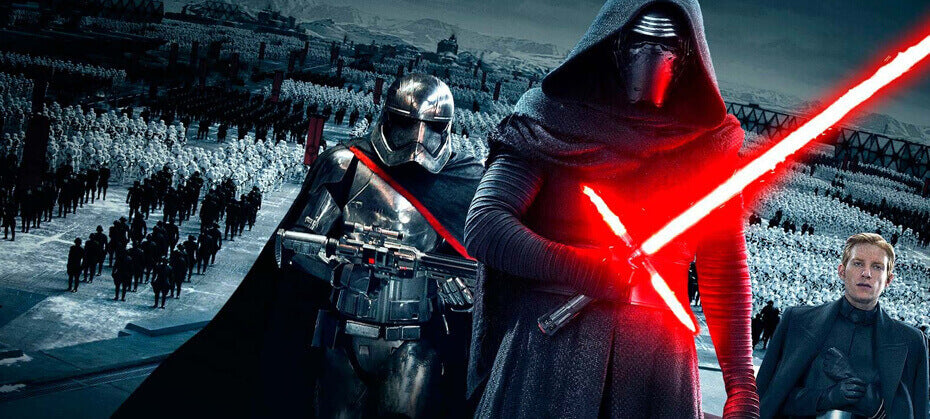It's been 40 years since the premiere of the most talked-about galactic saga. George Lucas's work is enjoying excellent health, improving with age and with millions of fans awaiting new adventures. Therefore, in this post, we discuss two options for viewing the Star Wars saga in the order in which you can watch it.
If you've been thinking about revisiting all the films to relive their plots, iconic scenes, and epic battles, we've got two ways to help you rewatch the Star Wars saga.
As you may know, one of the saga's curiosities lies in the release dates of each of the films. Thus, the Classic Trilogy began with Episode IV in 1977 under the title A New Hope . This was followed by The Empire Strikes Back (1980) and later Return of the Jedi (1983). Then came the Prequel Trilogy with Episodes I, II, and III , serving as a preliminary narrative to complete the story of the Skywalker family. More recently, you'll find Rogue One as a spin-off of the main plot and the current trilogy, with The Force Awakens , The Last Jedi , and the upcoming Episode IX .
If you want to keep track of release dates chronologically, this is the option you should follow when deciding the order to watch the Star Wars saga. This line will have you first watching the so-called Classic Trilogy, which includes Episodes IV, V, and VI. From here, you would skip to Episode I, The Phantom Menace, which was released 14 years later. Here, you'll notice a technological leap, as the film industry has improved enormously over the years. During this Prequel Trilogy, you'll have to continue with Episodes II and III, which connect with the story of the Classic Trilogy.
From 2005, you'll jump to 2015, with one of the most recent releases, Episode VII: The Force Awakens. This seventh episode takes you 30 years after the events of Return of the Jedi, which kicks off the new trilogy. To finish off your choice of release order, you must stop at Rogue One: A Star Wars Story. This spin-off places you in the events that occur between Episode III and Episode IV, just before the start of the Classic Trilogy.
To summarize, this would be the order you should follow:
With this option, you'll review the logical narrative within the story. This way, you'll avoid time jumps between one trilogy and another, allowing you to fully understand the main plot and subplots. In this order, all events in the Star Wars saga will unfold as if it were a series divided into several chapters.
If you choose this option, the order would be:
You have many hours of fun ahead! And to experience the excitement of the Star Wars saga from home, we recommend equipping your living room with one of the True Wireless sound towers available at Energy Sistem . You'll have twice the sound power so you don't miss a single detail of the movies. Enjoy!
If you've been thinking about revisiting all the films to relive their plots, iconic scenes, and epic battles, we've got two ways to help you rewatch the Star Wars saga.
As you may know, one of the saga's curiosities lies in the release dates of each of the films. Thus, the Classic Trilogy began with Episode IV in 1977 under the title A New Hope . This was followed by The Empire Strikes Back (1980) and later Return of the Jedi (1983). Then came the Prequel Trilogy with Episodes I, II, and III , serving as a preliminary narrative to complete the story of the Skywalker family. More recently, you'll find Rogue One as a spin-off of the main plot and the current trilogy, with The Force Awakens , The Last Jedi , and the upcoming Episode IX .
In order of release
If you want to keep track of release dates chronologically, this is the option you should follow when deciding the order to watch the Star Wars saga. This line will have you first watching the so-called Classic Trilogy, which includes Episodes IV, V, and VI. From here, you would skip to Episode I, The Phantom Menace, which was released 14 years later. Here, you'll notice a technological leap, as the film industry has improved enormously over the years. During this Prequel Trilogy, you'll have to continue with Episodes II and III, which connect with the story of the Classic Trilogy.
From 2005, you'll jump to 2015, with one of the most recent releases, Episode VII: The Force Awakens. This seventh episode takes you 30 years after the events of Return of the Jedi, which kicks off the new trilogy. To finish off your choice of release order, you must stop at Rogue One: A Star Wars Story. This spin-off places you in the events that occur between Episode III and Episode IV, just before the start of the Classic Trilogy.
To summarize, this would be the order you should follow:
- Star Wars Episode IV: A New Hope (1977)
- Star Wars Episode V: The Empire Strikes Back (1980)
- Star Wars Episode VI: Return of the Jedi (1983)
- Star Wars Episode I: The Phantom Menace (1997)
- Star Wars Episode II: Attack of the Clones (2002)
- Star Wars Episode III: Revenge of the Sith (2005)
- Star Wars Episode VII: The Force Awakens (2015)
- Rogue One: A Star Wars Story (2016)
- Star Wars Episode VIII: The Last Jedi (2017)
- Han Solo (2018)
- Episode IX: The Rise of Skywalker (2019)
In order of internal history
With this option, you'll review the logical narrative within the story. This way, you'll avoid time jumps between one trilogy and another, allowing you to fully understand the main plot and subplots. In this order, all events in the Star Wars saga will unfold as if it were a series divided into several chapters.
If you choose this option, the order would be:
- Star Wars Episode I: The Phantom Menace (1997)
- Star Wars Episode II: Attack of the Clones (2002)
- Star Wars Episode III: Revenge of the Sith (2005)
- Han Solo (2018)
- Rogue One: A Star Wars Story (2016)
- Star Wars Episode IV: A New Hope (1977)
- Star Wars Episode V: The Empire Strikes Back (1980)
- Star Wars Episode VI: Return of the Jedi (1983)
- Star Wars Episode VII: The Force Awakens (2015)
- Star Wars Episode VIII: The Last Jedi (2017)
- Episode IX: The Rise of Skywalker (2019)
You have many hours of fun ahead! And to experience the excitement of the Star Wars saga from home, we recommend equipping your living room with one of the True Wireless sound towers available at Energy Sistem . You'll have twice the sound power so you don't miss a single detail of the movies. Enjoy!


Leave a comment
This site is protected by hCaptcha and the hCaptcha Privacy Policy and Terms of Service apply.